This video can not be played
To play this video you need to enable JavaScript in your browser.
Rail passengers in Wales are dealing with the biggest strike in 30 years.
Fewer than 10% of normal services will run, Network Rail confirmed, on the first of three days of industrial action across the UK.
Last-minute talks between unions and rail bosses failed to broker peace in a row over pay and proposed job losses.
Commuters have been advised to avoid travelling by train as the few services that are running are likely to be full.
Major Welsh company Admiral, with 7,000 staff in Cardiff, Newport and Swansea, encouraged employees to work from home.
'Limit potential disruption'
Rhian Langham, of the insurance group, said: "We're aware that the rail strikes could impact our colleagues' journeys into the office, but as a business that embraces hybrid working, our colleagues have the resources and flexibility to work from home.
"So we've encouraged those who feel that they'll be unable to get to the office as planned to work from home to help limit the potential disruption to them and our customers."
Motorists have been warned to expected a surge in vehicles on the roads, and there were reports of slow traffic across Wales during the morning rush hour.
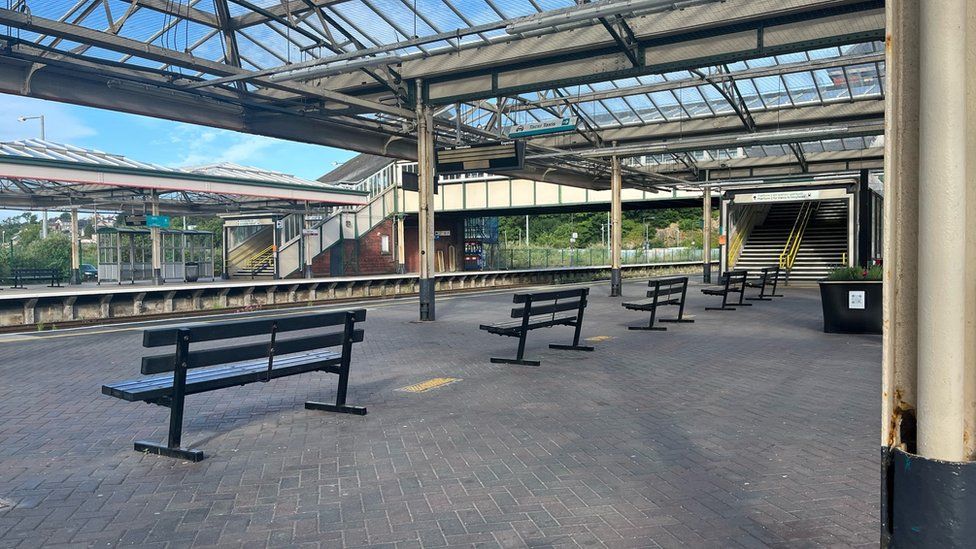
The roads affected included: M4 eastbound at J23A A4810 (Magor Services); A470 southbound from A468 Caerphilly Road (Nantgarw interchange) to M4 J32 (Coryton interchange); A4138 from Llangennech) to M4 J48 at Llanelli; A525 eastbound at A483 J4 (Coedpoeth); A483 Wrexham bypass northbound; Before A55 J38 (Posthouse roundabout); A466 Wye Valley Link Road westbound.
Morgan Stevens of Newport Bus said the company saw 10% more passengers compared to last Tuesday.
He added that they were using double deckers for the busier regional routes such as Newport to Cardiff to cope with any increase in demand.
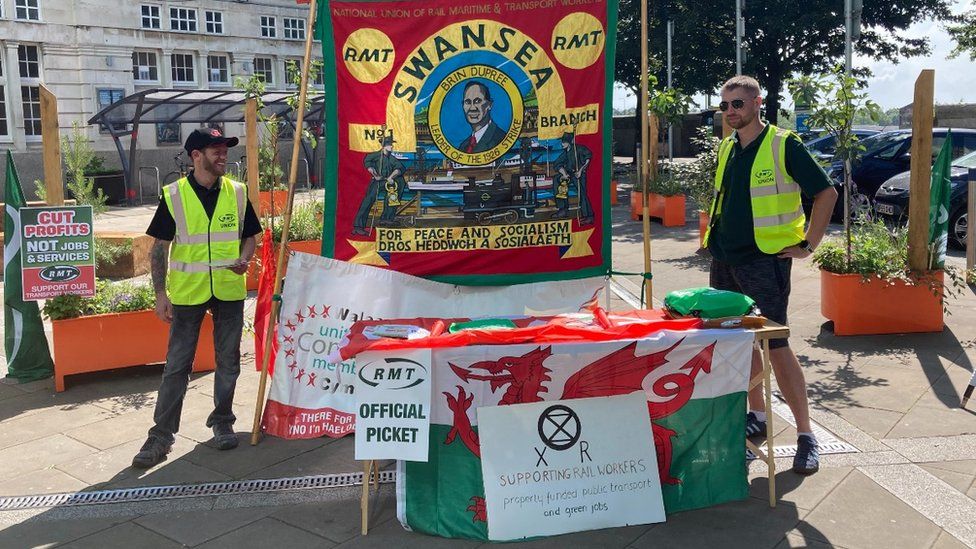
The Welsh government is urging road users to plan ahead and allow more time for journeys.
Economy Minister Vaughan Gething said the UK government had "chosen to promote conflict".
'Half a billion pounds profit'
"The way to resolve this matter is not to have more petrol on the flames which is the approach of Grant Shapps and others in the UK government," he said.
"The way to resolve this is to get people back around the negotiating table and allow people to negotiate. Let's not forget this is an industry where half a billion pounds of profit was generated last year."
The Welsh government could face calls for inflation-proof pay rises from unions representing health and other public services workers.
Mr Gething said: "We will be entirely open and honest with trade unions about what it is possible to do in each and every one of our areas."
He claimed the Welsh government's hands were tied by funding from Westminster.
There would be "real difficulty for all of us" unless the Treasury provided the funding to increase wages in line with inflation, Mr Gething said.
'I fully support them'
Cynon Valley Labour MP Beth Winter, who joined RMT union members on the picket line, said strike action was "very much a last resort".
"The threat of compulsory redundancies, below inflation pay increases and threats to the working condition and terms of the workers has left the RMT members without any option but to take this action so I fully support them," she told BBC Radio Wales Breakfast.
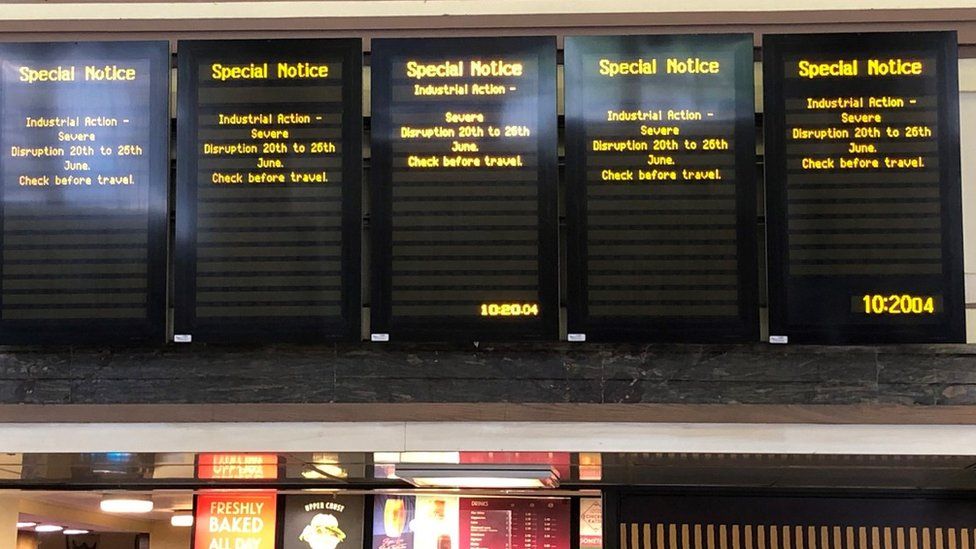
"Workers deserve an inflation-proof pay rise.... for me as a trade unionist, we have to be supporting our workforce," the MP added.
Swansea Conservative councillor Louise Thomas said the strike would hurt people who are already struggling, such as those on zero hours contracts or carers.
"I just don't think it's the right time to strike at all. We've just gone through a pandemic. People are really, really struggling,"
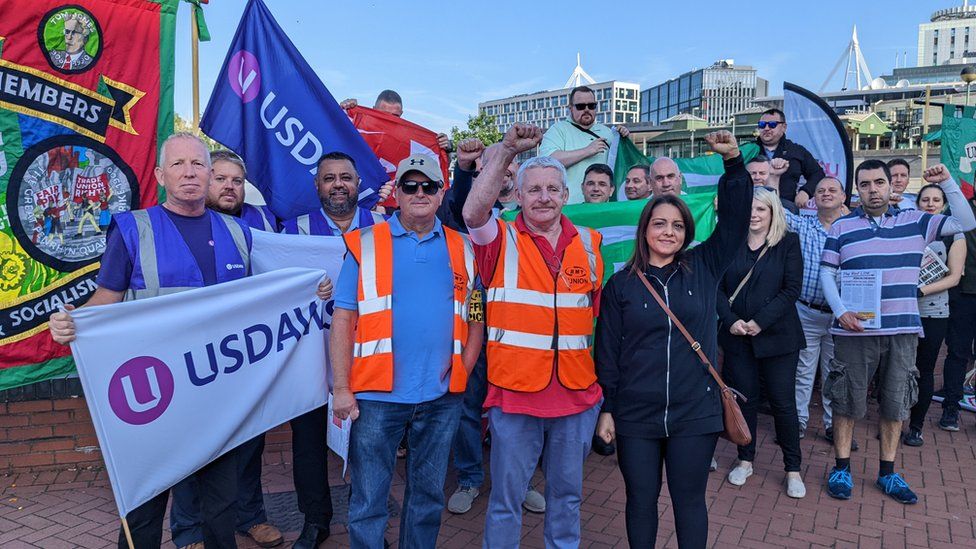
"It's affecting the wider community," she said. "All people want to do is go to work. They want to put food on the table."
A Welsh government spokesperson said: "We strongly urge the UK government to do all it can to resolve the disputes with the rail unions.
"While staff at Transport for Wales are not striking, the impact on rail services in Wales has been and will be extensive. Passengers should expect severe disruption and check advice from train operators before travelling."
Weekend working dispute
Stuart Cole, professor of transport economics at the University of South Wales, said the three-day walkout was due in particular to a dispute over a seven-day working week.
In the past, staff were given the option of not working on Sundays.
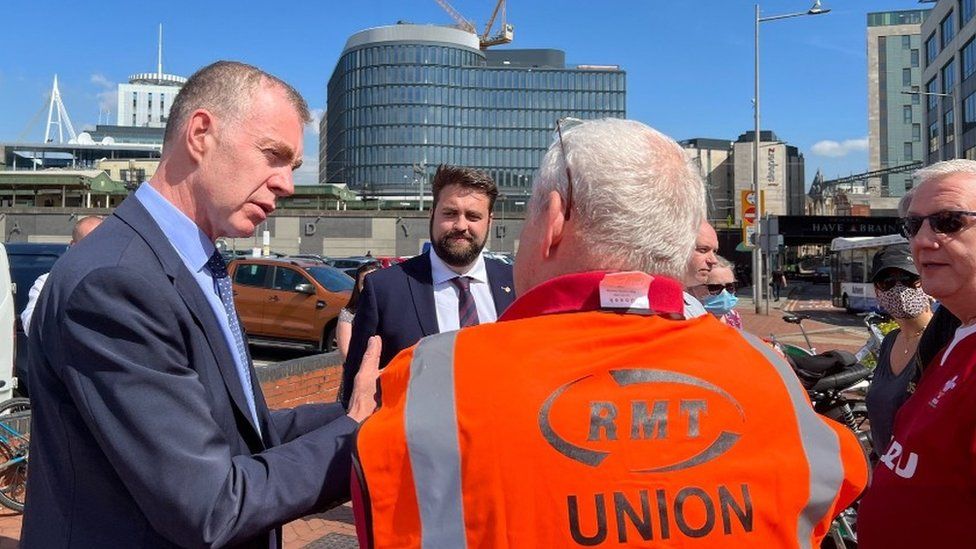
But Prof Cole said the economics of the railways industry had changed, with the weekend now part of the working week.
"Railway demand for leisure travel is up by 50% compared with a reduction in commuting by 40%. That change in the market place shows the importance of that weekend working," Prof Cole told Radio Wales.
Teresa Davies from Ewloe in Flintshire, who has dementia, regularly uses the trains and is dog sitting for a friend in Powys at the moment. She was planning to return home this week.
"I need to go home tomorrow, it's making me quite anxious," she said. "It's a two and a half hour drive each way."
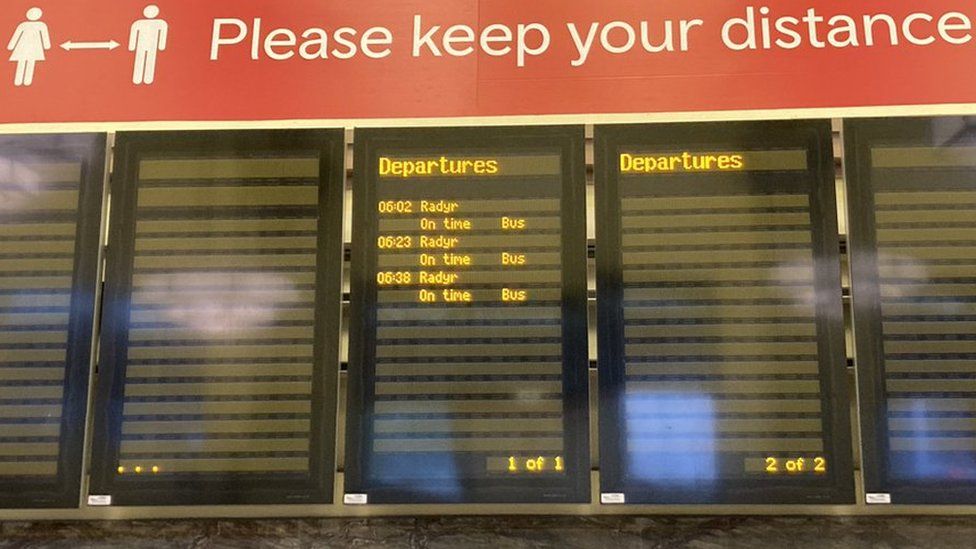
"I do travel a lot. I'm quite independent and I'm fine travelling but when things go wrong, when things don't go to plan it can make my dementia worse. I can get very anxious, it's not good," she said.
There are no trains west of Cardiff nor north of Merthyr Tydfil on strike days and a special timetable for 20 to 26 June has been published.
There are limited services on the valley lines between Radyr and Treherbert, Aberdare and Merthyr Tydfil, which is owned and operated by Transport for Wales, with a rail replacement bus link between Radyr and Cardiff Central.
Transport for Wales is not involved in the dispute, that includes guards, catering staff, signallers and track maintenance workers, but cannot run services as Network Rail maintains tracks in Wales.
The RMT union wants a pay rise of 7% to deal with the rising cost of living, but it says employers are offering a maximum of 3% on condition they also accept job cuts and changes to working practices.
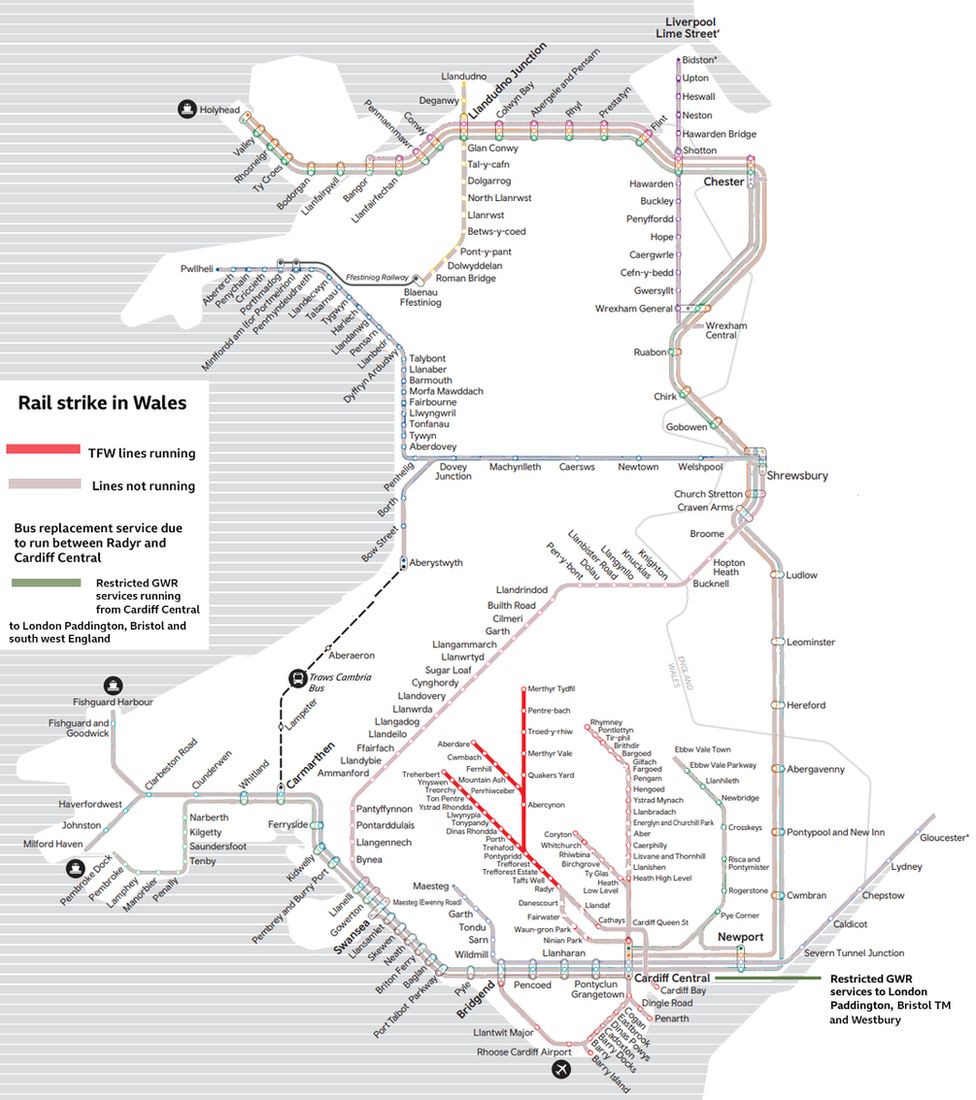

Rail strike advice

Can I get a refund? Yes, if you cannot get your train due to strike action. Season-ticket holders can apply for a refund for the days affected. Find more info here.
Do I have to go to work or school? This is up to your individual employer or school, check with them.
How can I plan my train journey? Use the National Rail journey planner.
Read more here.

The RMT is unhappy about stagnating pay and proposed job losses and has threatened further action "for as long as it takes to get a settlement", potentially for six months or more.
Steve Skelly of the RMT in Wales said it had had none of the assurances it wanted from neither the UK government nor train companies.
Mr Skelly said: "The reality is that we've had no other option but to ballot our members for industrial action. For some of our members this has been the third year of a pay freeze."
UK Transport Secretary Grant Shapps has dismissed a call from the RMT for ministerial intervention and said negotiations should be between unions and employers. The Labour Party has also called on the government to step in.
Welsh Conservatives' transport spokeswoman Natasha Asghar said: "Whilst I support workers' right to strike, this rail walkout is set to cause huge disruption not just across Wales but the rest of the UK."
She urged unions to "abandon the working practices of the 1950s, get round the table and use the changes in practices to give the staff a pay rise".
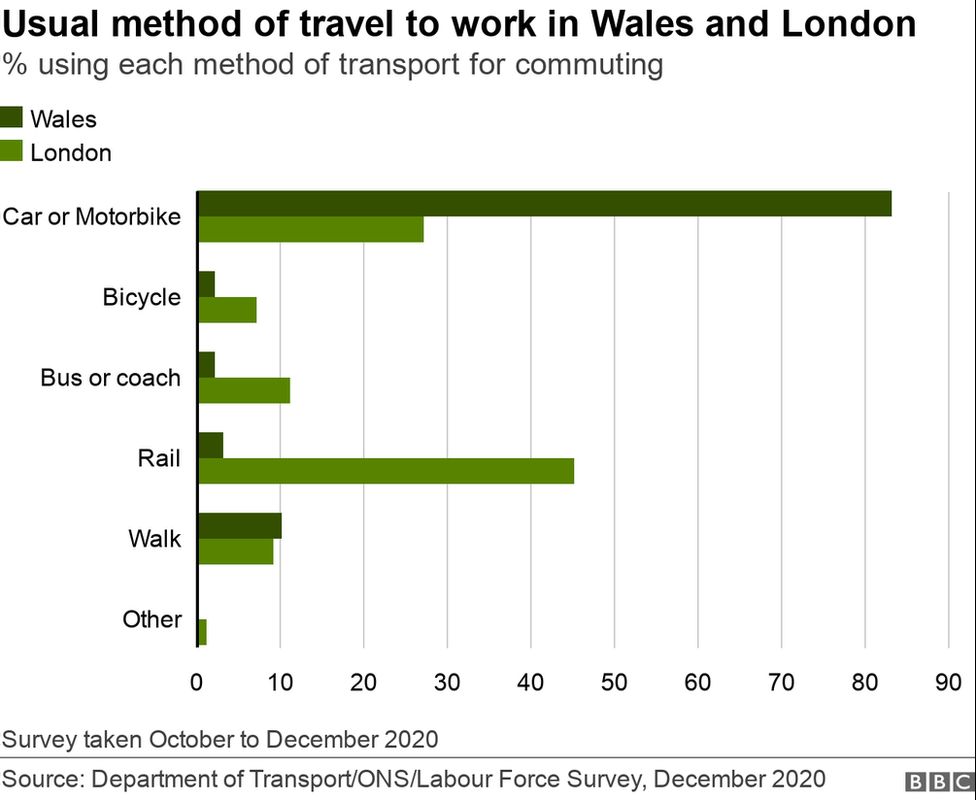
How many of us travel to work by train?
In 2020, it was estimated that only 3% of commuting in Wales was by rail. This compared to 10% on average across Britain and as high as 45% in London.
In Wales, more than 80% of commuters still travel to work by car, which is higher than all English regions and Scotland, according to Department of Transport figures.

How are the rail strikes affecting you? Get in touch by emailing: haveyoursay@bbc.co.uk.
Please include a contact number if you are willing to speak to a BBC journalist. You can also get in touch in the following ways:
- WhatsApp: +44 7756 165803
- Tweet: @BBC_HaveYourSay
- Or fill out the form below
- Please read our terms & conditions and privacy policy
If you are reading this page and can't see the form you will need to visit the mobile version of the BBC website to submit your question or comment or you can email us at HaveYourSay@bbc.co.uk. Please include your name, age and location with any submission.

- FIGHT FOR YOUR RIGHTS: X-Ray returns and they've got your back
- SPOTLIGHT ON THE NHS: Is Covid masking a bigger problem with our health service?

https://news.google.com/__i/rss/rd/articles/CBMiLGh0dHBzOi8vd3d3LmJiYy5jby51ay9uZXdzL3VrLXdhbGVzLTYxODY3MTM10gEwaHR0cHM6Ly93d3cuYmJjLmNvLnVrL25ld3MvdWstd2FsZXMtNjE4NjcxMzUuYW1w?oc=5
2022-06-21 11:54:29Z
1471253390
Tidak ada komentar:
Posting Komentar